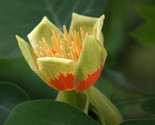20 Seeds Tulip Tree Liriodendron Tulipifera
Shipping options
Seller handling time is 2-14 business days Details
This reflects the seller's handling time and may not include time spent in transit.
If you have questions about shipping, please contact the seller.
FREE via to United States
Return policy
None: All purchases final
Payment options
PayPal accepted
PayPal Credit accepted
Venmo accepted
PayPal, MasterCard, Visa, Discover, and American Express accepted
Maestro accepted
Amazon Pay accepted
Nuvei accepted
Shipping options
Seller handling time is 2-14 business days Details
This reflects the seller's handling time and may not include time spent in transit.
If you have questions about shipping, please contact the seller.
FREE via to United States
Return policy
None: All purchases final
Payment options
PayPal accepted
PayPal Credit accepted
Venmo accepted
PayPal, MasterCard, Visa, Discover, and American Express accepted
Maestro accepted
Amazon Pay accepted
Nuvei accepted
Item traits
| Category: |
Seeds & Bulbs
|
| Quantity Available: |
10 in stock
|
| Condition: |
New
|
| UPC: |
Does Not Apply
|
| USDA Hardiness Zone: |
View details
4 (-30 to -20 °F), 5 (-20 to -10 °F), 6 (-10 to 0 °F), 7 (0 to 10 °F), 8 (10 to 20 °F), 9 (20 to 30 °F)
|
| Brand: |
Unbranded
|
Listing details
|
Seller policies:
|
View seller policies
|
|
Shipping discount:
|
Seller pays shipping for this item.
|
|
Posted for sale:
|
More than a week ago
|
|
Item number:
|
871631135
|
20 Seeds Tulip Tree Liriodendron Tulipifera
The Tulip Tree is a large, magnificent, stately tree that is renowned for its regal form and its beautiful, unique blossoms. It is a tall tree with a columnar trunk and upright, curving branches. The trunk has ridged, light brown bark and it may be free of branches for much of its length so that it resembles a Greek column. It is the largest hardwood tree that is native to eastern North America. It can grow up to 180 feet in height and with a thick trunk that can be several feet in diameter. In the spring, it has large, goblet-shaped flowers that are unlike the flowers of any other tree. The flowers are light green or pale yellow with an orange band and the base of each petal. The flowers resemble the blossoms of a tulip, and so the tree is called the Tulip Tree. The leaves of the Tulip Tree are also unique. They are medium or bright green and very lush in appearance. They have four lobes or they are unlobed and they have a squarish apex. Leaves are deciduous and they turn golden yellow in the autumn. Flowers are followed by dry, scaly, oblong, cone-shaped brown fruits, each bearing numerous winged seeds. The Tulip Tree is related to the magnolias and, like them, it is also an ancient and very primitive flowering plant. It is widely grown as a specimen tree, a shade tree, a street tree and as a flowering tree. Avenues lined with rows of large Tulip Trees are very beautiful. It is also called the Yellow Poplar. Wood is used for furniture, plywood, boatbuilding, paper pulp and general lumber. Native Americans made dugout canoes from Tulip Tree trunks. This is the state tree of Kentucky, Tennessee and Indiana.
Growing Instructions
1. Soak the seeds in water for 24 hours.
2. Cold stratify the seeds to break their winter dormancy. Put some moist sand or a mixture of moist sand and compost in a ziplock bag.
3. Mix the seeds into the mixture.
4. Put the ziplock bag in the refrigerator for 12-16 weeks.
5. Plant the seeds in pots with potting soil.
6. Water the seeds.
7. When the seedlings are a few inches tall, they can be transplanted.
